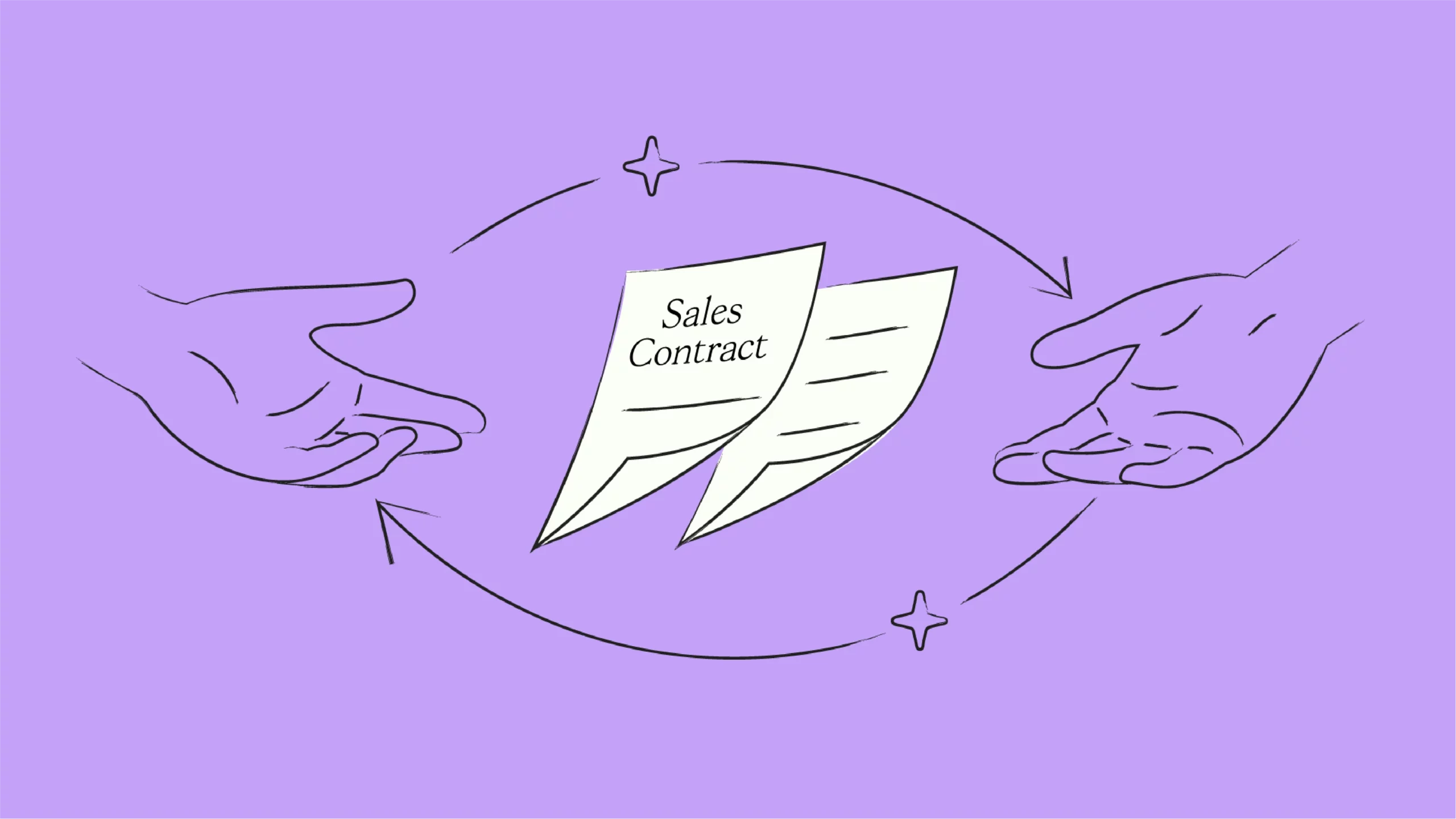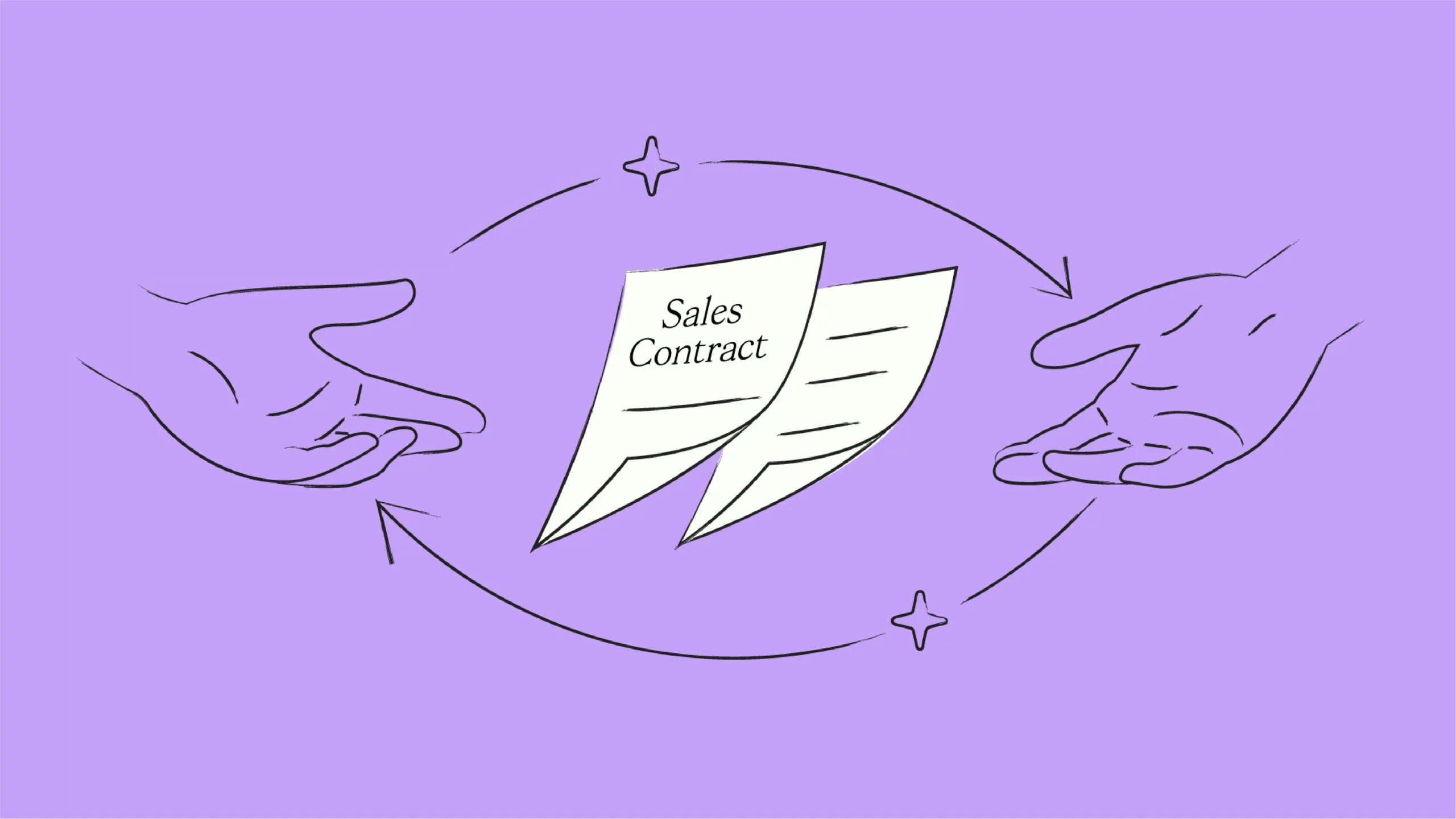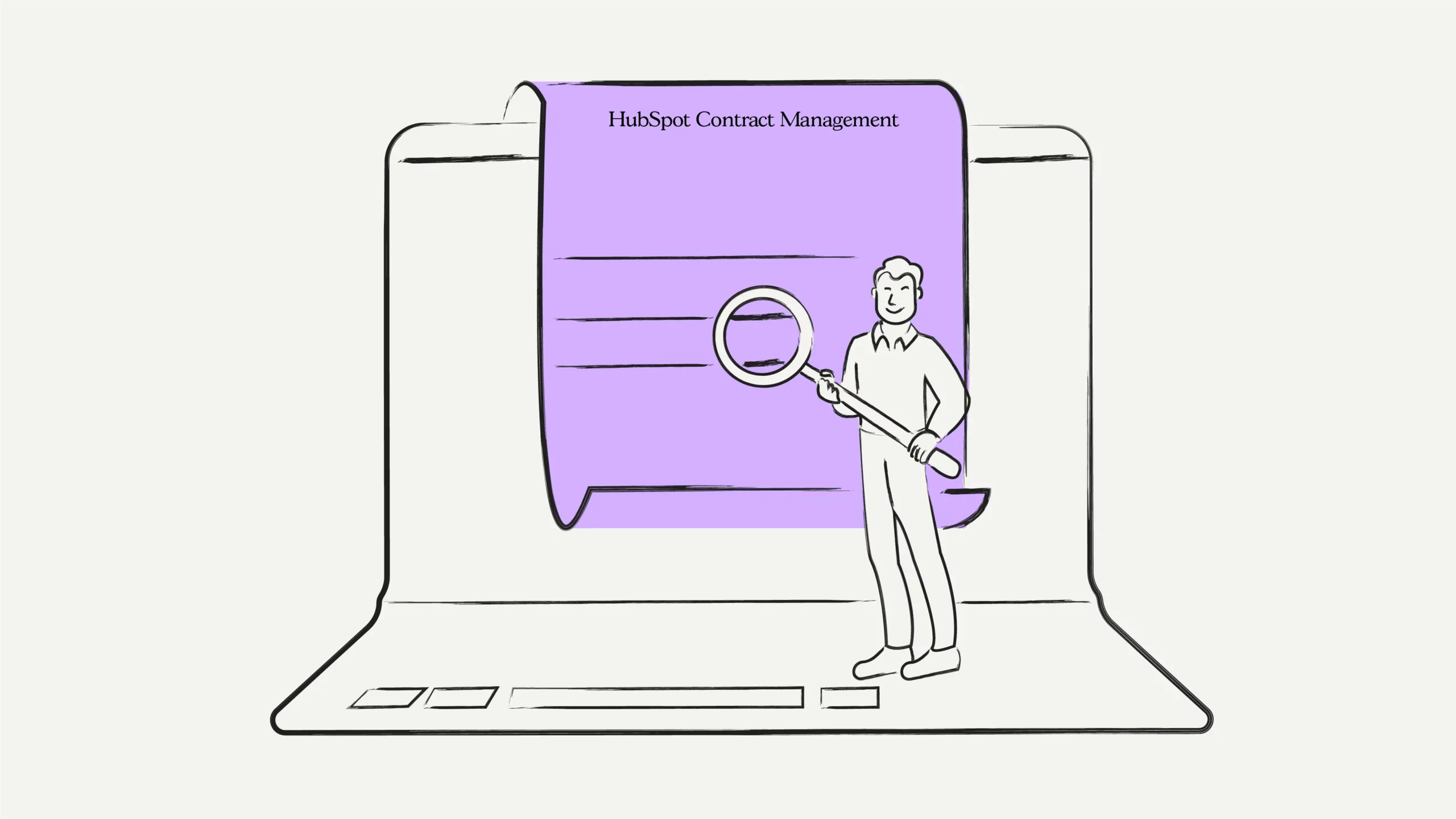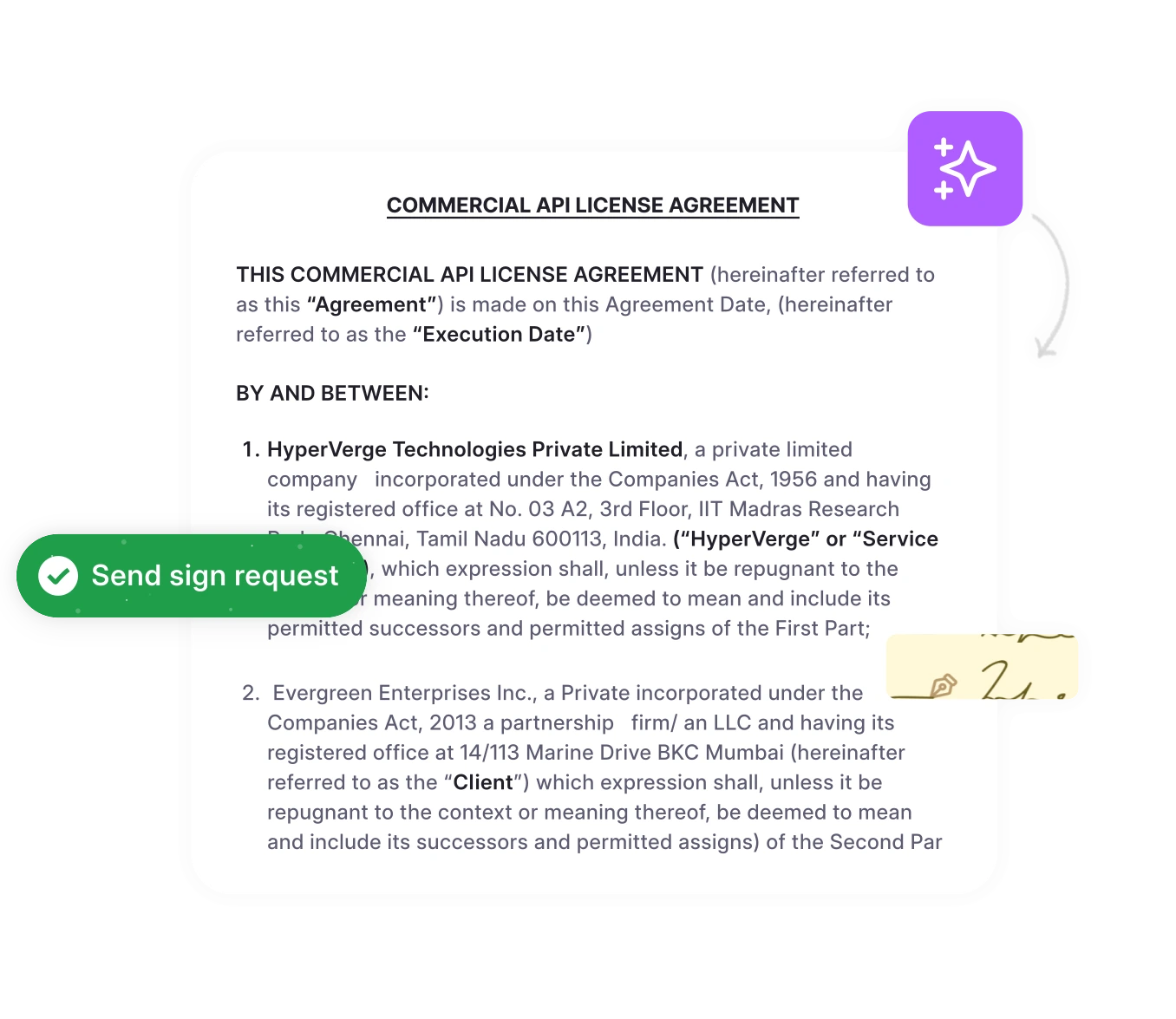Ever been stuck in a deal where expectations weren’t clear, timelines slipped through the cracks, or payments got delayed? These challenges can derail even the most promising sales transactions.
According to the World Commerce & Contracting (WorldCC) 2023 Benchmark Report, organizations experience an average contract value erosion of 8.6%. This statistic highlights how poor contract management jeopardizes business relationships and erodes potential value.
This is where a sales contract becomes your ultimate solution.
A well-drafted sales agreement lays out the terms of the agreement in black and white, turning potential chaos into a streamlined and professional transaction. It’s your blueprint for a fair, transparent, and enforceable deal, protecting both the buyer and seller from risks while fostering confidence.
In this blog, you’ll learn the essentials of sales contracts, including their purpose, key benefits, various types, and the critical elements that make them legally sound.
Let’s start with the basics first.
What is a sales contract?
A sales contract is a legally binding agreement between a buyer and a seller that defines the terms of a transaction. It specifies what is being sold, at what price, and under what conditions. For instance, a purchase agreement in a sales contract clearly defines the property details, payment schedules, and contingencies in a real estate deal, ensuring all parties are aligned.
Unlike informal or verbal agreements, a legally binding contract offers legal enforceability, reducing risks and misunderstandings. It is a critical tool in simple and complex transactions, ensuring clarity, compliance, and mutual accountability.
Whether the transaction involves goods, services, or both, a sales contract guarantees that all expectations are documented and understood.
Understanding its purpose underscores why it is indispensable for buyers and sellers alike. Let’s explore its key benefits.
Why is a sales contract important?
1. Establishes legal accountability for transactions
A sales agreement or purchase agreement turns a handshake deal into a legally binding document. It holds both parties accountable for their promises, particularly when the purchase price, payment terms, and other conditions are clearly outlined.
2. Ensures transparency in transaction details
Ever had a deal fall apart because of a misunderstanding? A sales contract prevents that by spelling out every detail—what’s being sold, the sales price, payment terms, and delivery timelines.
These contracts reduce misunderstandings and disputes, from clearly outlining terms in a general sales agreement to documenting payment terms in a purchase agreement. It also facilitates a smooth negotiation process, ensuring clarity and fairness before finalizing the agreement.
3. Protects buyers and sellers from disputes
Whether you’re buying or selling, a sales agreement acts as your safety net. It defines the rights and responsibilities of both parties, reducing the chances of disputes and protecting your interests if things don’t go as planned. Consulting your legal team during this process can help ensure that the contract addresses potential risks and liabilities.
4. Mitigates risks associated with sales
Sales contracts anticipate challenges like delays, product defects, or non-compliance. They include provisions such as warranties, liability limitations, and dispute resolution clauses to address these issues proactively.
Example: A contract with clearly defined penalties for delayed shipments can prevent financial losses and ensure accountability.
5. Defines ownership transfer conditions
A sales agreement makes it clear when ownership officially changes hands. Whether it’s after payment, delivery, or both, this clarity is key to avoiding any “who owns what” confusion down the line.
6. Offers recourse for breach of contract
What if the other party doesn’t keep their end of the bargain? A sales contract ensures you’re not left hanging. It gives you legal options to recover losses or enforce the terms if someone fails to deliver on their promises.
Now let’s look at the different types you might encounter and how they cater to various transaction needs.
Struggling with sales contract delays?
Simplify and speed up the process—create accurate sales contracts in just 2 minutes with HyperStart.
How many types of sales contracts exist?
Here are the most common 7 types of sales contracts:
1. General sales contract
The backbone of everyday transactions, this contract is used for standard agreements involving goods or services. Commonly found in industries like retail or wholesale, a general sales contract covers essential details like:
Product/service description: Clear identification of what’s being sold.
Sales price: The agreed-upon cost.
Payment details: How and when payment will be made.
Delivery timelines: When goods will be delivered or services rendered.
Example: A wholesale supplier selling office supplies to a business would use a general sales contract. General sales contracts are suitable for various everyday transactions across various industries.
2. Conditional sales agreement
In a conditional sales agreement, the buyer takes possession of the goods, but the buyer also agrees that ownership remains with the seller until specific conditions are met, usually full payment. This is common for high-value purchases like vehicles or heavy machinery. It provides the seller with security until the buyer fulfills their financial obligations.
Example: Buyer purchases from consumer credit like the purchase of a car. The buyer doesn’t own it outright until all payments are completed.
3. Installment sales contract
This type of contract allows buyers to pay for goods or services over time through a series of scheduled payments. Instead of a large upfront sum, the buyer makes regular installments until the total price is paid. This is often used for significant purchases like appliances, furniture, or vehicles, making them more accessible to buyers.
Example: Furniture retailers commonly offer installment plans, allowing customers to pay monthly over a set period.
4. Fixed price sales contract
As the name suggests, a fixed-price sales contract establishes a set price for the goods or services at the beginning of the agreement. This price remains constant throughout the transaction, regardless of any fluctuations in market prices or production costs.
Fixed-price sales contracts are frequently used in real estate transactions, providing price certainty for both buyer and seller.
Example: Real estate agreements often use fixed-price contracts to ensure predictable costs for buyers and sellers.
5. Open-ended sales contract
Unlike fixed-price contracts, open-ended sales contracts offer flexibility in specific terms, such as pricing, delivery schedules, or service levels.
These adjustments are often based on future conditions, market changes, or the ongoing relationship between the parties. This is particularly useful for long-term service agreements or ongoing supply contracts where adjustments may be necessary.
Example: A SaaS provider offering long-term subscriptions with adjustable user licenses or service levels.
6. Master service agreement (MSA)
A Master Service Agreement (MSA) is a comprehensive contract that outlines the overarching terms and conditions governing future transactions between two parties. It acts as a framework for subsequent agreements, streamlining negotiations and saving time and resources.
MSAs are particularly valuable in long-term business relationships where multiple projects or services are expected to be delivered over time.
Example: Tech companies use MSAs for ongoing software development or IT services, minimizing the need to renegotiate basic terms.
7. Order forms agreement
Buyers use order forms to request specific goods or services from a seller. They typically include details such as:
Items ordered: Specific products or services requested.
Quantities: Number of units or service hours.
Shipping details: Delivery address and preferred shipping method.
Payment terms: How and when payment will be made.
Order forms are frequently used for upsell agreements, where additional products or services are offered alongside the original purchase.
Once both parties sign, an order form becomes a legally binding agreement for that specific transaction. To make a contract genuinely effective, it must include key elements that ensure its legality and clarity. Let’s explore some insights on what makes these agreements reliable.
Say goodbye to sales contract bottlenecks
HyperStart’s innovative features, like AI-powered redlining and automated alerts, make contract management simple and effective.
What are the essential elements of a sales contract?
1. Identifying the parties involved
The contract must identify all parties involved in the transaction. This includes two parties: the buyer and the seller:
Accurate identification of both the buyer and the seller.
Ensuring that both parties have the legal capacity to enter into a contract (e.g., they are of legal age and mentally competent).
2. Describing the goods or services
Vague descriptions lead to misunderstandings and disputes. A good sales agreement provides a detailed description of what is being sold, including:
Quantity: The number of units or the scope of services.
Quality: Specific standards or grades.
Specifications: Technical details, measurements, or features.
Unique identifiers: Serial numbers, model numbers, or other identifying information.
3. Establishing the price
The contract must clearly state the agreed-upon purchase price for the goods or services. This includes:
The overall cost of the transaction.
Specific payment methods, such as cash, check, or electronic transfer.
How and when payment is expected.
Deadlines tied to the closing date to ensure timely payments.
4. Defining transfer of ownership
This section clarifies when and how ownership of the goods transfers from the seller to the buyer. Key aspects include:
The specific date or event that triggers the transfer of ownership.
Any conditions that must be met before ownership changes hands (e.g., full payment).
5. Specifying delivery terms
For transactions involving physical goods, the contract must outline the delivery terms, including:
How will the goods be transported (e.g., shipping, delivery service, pickup)?
When the goods are expected to arrive?
The designated delivery address.
Who bears the cost of shipping and handling?
Special terms related to recurring sales for ongoing orders.
Which party is responsible for the goods if they are damaged or lost during transit.
6. Including warranties and guarantees
Warranties and guarantees assure the quality or performance of the goods or services. These can include:
Explicit statements about the product’s features or performance.
Warranties are automatically implied by law (e.g., warranty of merchantability).
The duration of the warranty coverage.
Protection for intellectual property rights, particularly in service-based agreements or software development.
Including warranties and guarantees ensures confidence in the transaction by covering quality assurance and liability clauses.
7. Detailing payment terms
This section specifies how and when payment will be made, including:
This section specifies how and when payment will be made, including:
Acceptable forms of payment (e.g., cash, check, credit card, electronic transfer).
When payments are due (e.g., upfront, upon delivery, in installments).
Any fees or interest charges for late payments.
Even with all the correct elements, sales contracts have challenges. Let’s explore some common limitations and practical ways to address them effectively.
What are the limitations of a sales contract? How can they be addressed?
Are sales contracts holding you back? Here’s how to overcome their challenges. Addressing these limitations proactively can help avoid delays, disputes, and inefficiencies. Let’s explore common issues and practical solutions to streamline sales contract management processes.
1. Delays in the approval process
Sales contracts often face bottlenecks during the contract approval workflows, especially when multiple stakeholders are involved. These delays can slow down deal closures and revenue generation.
Solution
Use sales contract management software to automate the approval workflows.
Establish clear guidelines for roles and responsibilities in the approval process.
Implement e-signature solutions to expedite contract execution.
2. Ambiguity in contract terms leads to dispute
Vague or unclear terms can lead to disputes or misinterpretations, jeopardizing business relationships.
Solution
Use precise and legally sound language when drafting contracts.
Incorporate glossaries or definitions for complex terms.
Leverage AI-powered tools for contract review to flag ambiguous clauses.
3. Liability clauses can create imbalances
Clauses that overly limit liability can discourage one party or create an imbalance in the agreement.
Solution
Negotiate liability clauses to ensure fairness while protecting both parties’ interests.
Consult legal experts to draft balanced limitations of liability provisions.
Use industry benchmarks to guide liability caps.
4. Inflexibility of contract terms
Rigid terms may fail to adapt to evolving circumstances, such as market changes or unforeseen events.
Solution
Include force majeure and renegotiation clauses to allow for adjustments.
Adopt dynamic templates that can be easily customized for specific deals.
Regularly review contracts and update templates to align with business needs.
5. Enforcement challenges hinder compliance
Without proper enforcement measures, non-compliance with contractual obligations can go unchecked.
Solution
Outline penalties for breaches and the steps for resolution.
Incorporate audit trails and contract reporting features in contract management tools.
Work with legal counsel to ensure contracts are enforceable under relevant laws.
6. Jurisdictional issues in global transactions
Disputes can arise from conflicting laws and regulations, especially in international sales contracts.
Solution
Specify governing law and jurisdiction within the contract.
Use international trade agreements or frameworks like the CISG (United Nations Convention on Contracts for the International Sale of Goods).
Seek advice from legal experts familiar with cross-border transactions.
International agreements must ensure proper compliance, including frameworks that address renewal agreements for long-term partnerships.
How HyperStart can help in sales contract management
HyperStart’s end-to-end contract lifecycle management platform offers significant advantages for managing sales contracts efficiently. Here are the key benefits highlighted by recent findings:
| Benefit | Description | Impact |
| Faster Contract Creation | Contracts can be created in 2 minutes with workflow templates. | Reduces time spent on drafting and speeds up the sales cycle. |
| Quick Review and Signing | Contracts are reviewed and signed up to 5 times faster. | Enhances process efficiency, allowing faster deal closures. |
| Significant Time Savings | Saves up to 80% of administrative time related to contracts. | Frees teams to focus on strategic priorities instead of manual tasks. |
| Accelerated Turnaround | Contracts are completed 80% faster from creation to execution. | Ensures faster transactions and improves overall workflow efficiency. |
| Streamlined Negotiations | AI-driven tools cut negotiation times by 75%. | Reduces delays in finalizing agreements and improves collaboration between parties. |
| Instant Contract Access | Contracts can be retrieved in as little as 2 seconds with AI search capabilities. | Provides immediate access to documents, saving time and improving responsiveness. |
| Cost Reduction | Saves an average of $20 per contract processed. | Lowers operational expenses, adding up to substantial savings over time. |
| Proactive Deadline Management | Automated alerts for renewals and expiration dates prevent missed deadlines. | Enhances compliance and ensures no missed opportunities or obligations. |
HyperStart simplifies every step of the sales contract lifecycle. For instance, the platform streamlines document creation and approvals, reducing the need for manual intervention. Additionally, HyperStart supports electronic signatures, allowing contracts to be executed faster and securely.
Real-world success with HyperStart
Qapita, a leading digital equity platform, reduced contract approval times by 80% and streamlined tracking of critical clauses like liability and indemnity using HyperStart.
The platform’s intuitive features ensured smooth adoption, empowering Qapita’s teams to manage over 2,400 client contracts efficiently. With HyperStart, businesses unlock more excellent contract value while saving time and reducing risks.
Want to simplify your sales contract process and save time? Book a demo with HyperStart and see how it works for your business.












